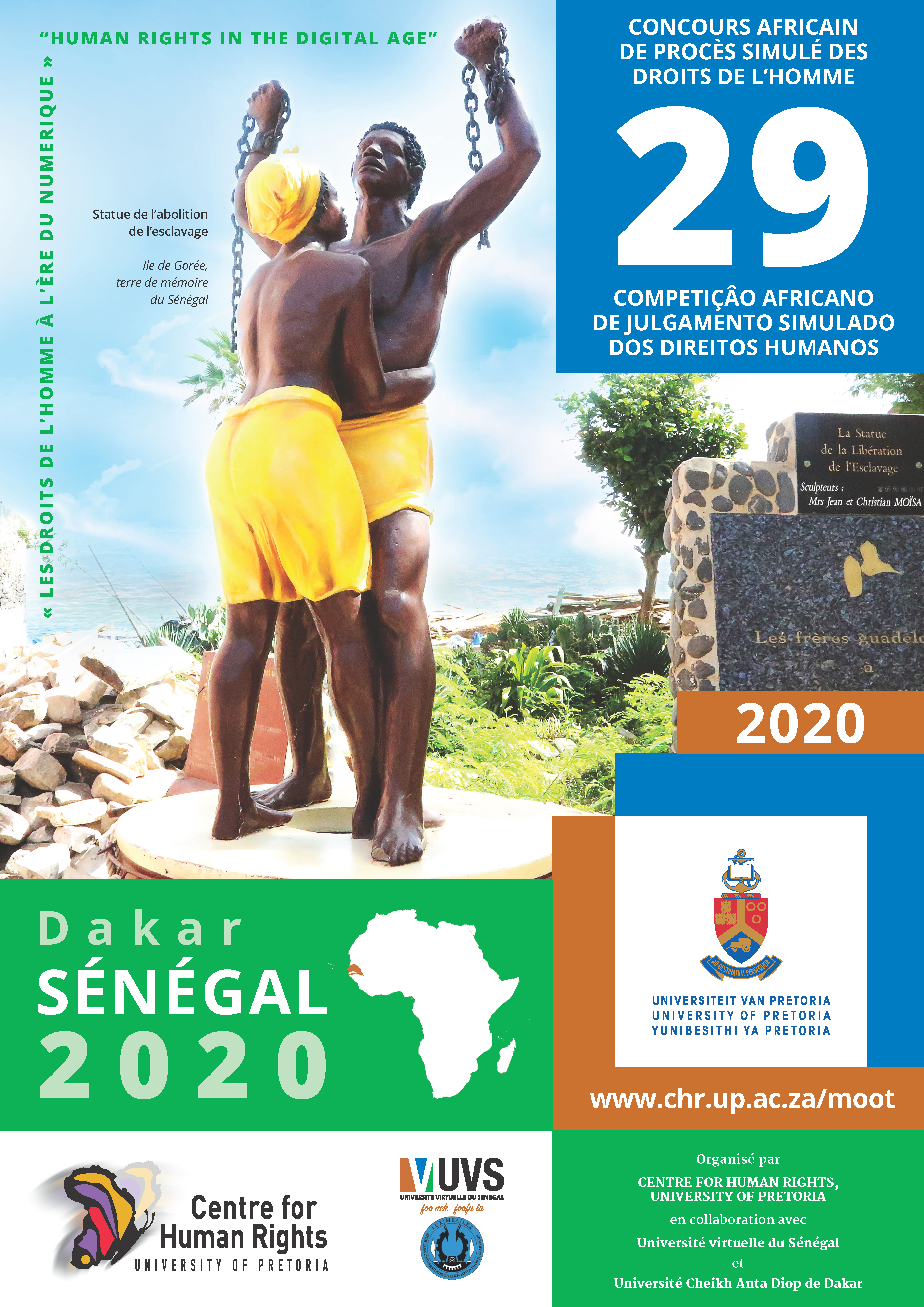|
African Human Rights Moot Court Competition (2020)
 The African Human Rights Moot Court Competition is the largest gathering of students, academics and judges around the theme of human rights in Africa. This annual event brings together all law faculties in Africa, whose top students argue a hypothetical human rights case as if they were before the African Court on Human and Peoples’ Rights. The Competition continuously prepares new generations of lawyers to argue cases of alleged human rights violations before the African Court. The African Human Rights Moot Court Competition is the largest gathering of students, academics and judges around the theme of human rights in Africa. This annual event brings together all law faculties in Africa, whose top students argue a hypothetical human rights case as if they were before the African Court on Human and Peoples’ Rights. The Competition continuously prepares new generations of lawyers to argue cases of alleged human rights violations before the African Court.
Current edition: Between NGO Liberty and Others and the State of Donamistan before the African Court on Human and Peoples’ Right. Materials for the current edition are available on the Competition website. The final rounds of the 29th African Human Rights Moot Court Competition will be held in Dakar, Senegal, and hosted by the Université Virtuelle de Sénégal (UVS) and Université Cheikh Anta Diop de Dakar (UCAD) from 16 to 19 December 2020.
In order to contribute to the preparation by participants in the Competition, the Codification Division has compiled resources available on the UN Audiovisual Library of International Law (AVL) for the 2020 edition of the Competition. Students will be able to draw on the resources available on the AVL website, including the Lecture Series and the Mini-Series, together with the related materials used in the preparation of lectures, the Historic Archives, as well as the International Law Handbook.
Lecture Series
The Lecture Series contains a permanent collection of lectures of enduring value on virtually every subject of international law delivered by leading international law scholars and practitioners from different regions, legal systems, cultures and sectors of the legal profession. Each lecture is accompanied by a list of related materials linking to documents available online. Lectures are available in video and audio formats.
A. Courts and Tribunals
International Adjudication and Arbitration
Procedure
Regional Courts
B. Human Rights
Introduction
Civil and Political Rights
Human Rights Bodies -Introduction
Indigenous Peoples
Judicial Remedies
Racial Discrimination
Regional Perspectives
Treaties
C. International Law
National Law
Sources of Law
D. International Migration Law
E. Peaceful Settlements of Disputes
F. Peace and Security
Security Council
Terrorism
G. Regionals Organizations
Mini-Series
The Mini-Series is a series of lectures delivered by leading international law scholars which aims to provide a general overview of the core topics of international law, primarily intended for users with basic or little knowledge of international law. Each mini-series provides a comprehensive introduction of the concerned topic and presents key issues for further study, which are often covered by specialized lectures in the Lecture Series.
International Human Rights Law
Droit international des droits de l’homme
Mme Hélène Tigroudja
- Partie I - Introduction en droit international des droits de l’homme
- Partie II - Les sources hybrides du droit international des droits de l'homme
- Partie III - Les mécanismes de protection et de mise en œuvre des
droits de l'homme
- Partie IV - L’herméneutique du droit international des droits de l'homme
- Partie V - La mise en œuvre des droits de l’homme en droit interne
Historic Archives
The Historic Archives is a unique resource which contains significant international law instruments. Each entry contains an introduction to a particular instrument prepared by a scholar or practitioner with expertise on the subject, information on its procedural history and related documents, as well as the text and status of the instrument. It is accompanied by available audiovisual materials relating to the negotiation and adoption of the instrument at meetings or diplomatic conferences.
Human Rights
International Law Handbook
The International Law Handbook is a collection of instruments used by the Codification Division as study materials for its training courses under the Programme of Assistance. It is intended to be used as a general work of reference. It comprises four books, available free of charge on the AVL website:
- Book One contains the Charter of the United Nations and the Statute of the International Court of Justice, as well as instruments relating to the law of treaties, subjects of international law, diplomatic and consular relations, international responsibility, peaceful settlement of international disputes, international peace and security, international human rights law as well as movement of persons and international migration law.
- Book Two contains instruments relating to the law of armed conflict, international criminal law as well as disarmament and non-proliferation.
- Book Three contains instruments relating to the law of the sea, international environmental law and international watercourses.
- Book Four contains instruments relating to international labour law, law of cultural relations as well as international trade and investment law.
|